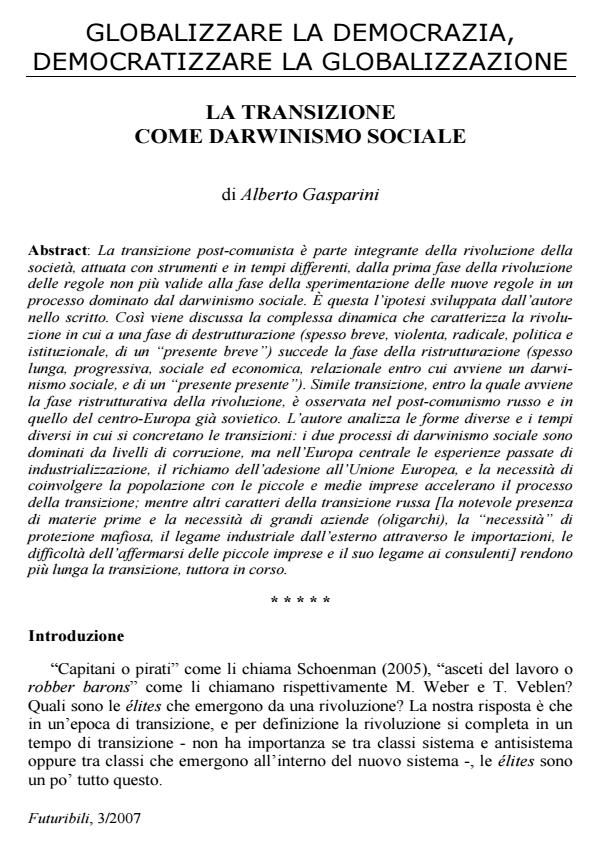La transizione come darwinismo sociale
Titolo Rivista FUTURIBILI
Autori/Curatori Alberto Gasparini
Anno di pubblicazione 2008 Fascicolo 2007/3 Lingua Italiano
Numero pagine 21 P. 19-39 Dimensione file 92 KB
DOI
Il DOI è il codice a barre della proprietà intellettuale: per saperne di più
clicca qui
Qui sotto puoi vedere in anteprima la prima pagina di questo articolo.
Se questo articolo ti interessa, lo puoi acquistare (e scaricare in formato pdf) seguendo le facili indicazioni per acquistare il download credit. Acquista Download Credits per scaricare questo Articolo in formato PDF

FrancoAngeli è membro della Publishers International Linking Association, Inc (PILA)associazione indipendente e non profit per facilitare (attraverso i servizi tecnologici implementati da CrossRef.org) l’accesso degli studiosi ai contenuti digitali nelle pubblicazioni professionali e scientifiche
Transition as social Darwinism Post-Communist transition is an integral part of a social revolution enacted by different means and at different times, from the first phase - changing the rules which have lost their validity - to the phase of experimenting with new rules in a process dominated by social Darwinism. That is the hypothesis developed by the author of this paper. There is a discussion of the complex dynamics characterising a revolution in which a destructuring phase (often brief, violent, radical, political and institutional - a brief present) is followed by a restructuring phase (often long, progressive, social and economic - a long present). Such a transition, involving the restructuring phase of the revolution, is observed in post-Communist Russia and central Europe. The author analyses the various forms and time-scales in which the transitions take place. The two processes of social Darwinism are dominated by various levels of corruption, but in central Europe the transition is accelerated by the past experience of industrialisation, the attraction of accession to the European Union and the need to involve the population with small and medium sized enterprises. The different characteristics of the Russian transition - the wealth of raw materials and the need for large companies (and oligarchs), the need for the protection provided by organised crime, the foreign industrial links created by the import-export trade and the difficulties faced by small companies, including their links with consultants - make the transition longer. It is still under way.;
Alberto Gasparini, La transizione come darwinismo sociale in "FUTURIBILI" 3/2007, pp 19-39, DOI: